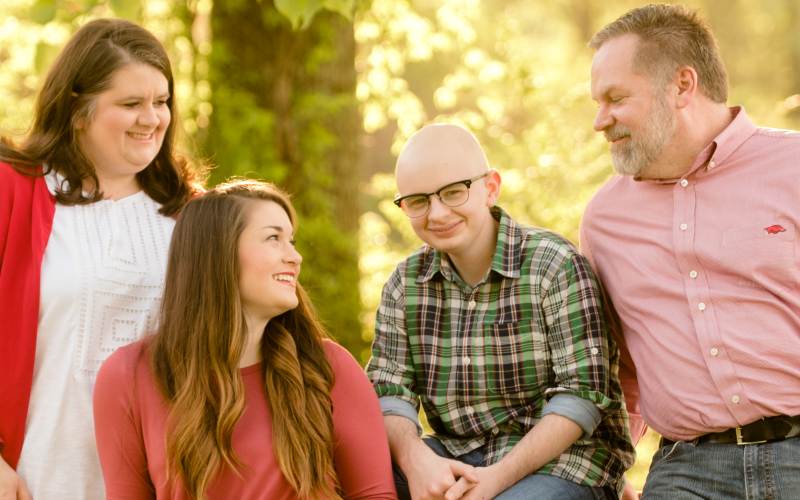
Out of options at his local children’s hospital, Eli’s family (pictured above) learned of a promising treatment plan at Children’s Hospital of Philadelphia – 1,200 miles from their home in Little Rock, Arkansas.
By: Shannon O’Connor
A childhood cancer diagnosis is often sudden and overwhelming. It is a difficult time for families to navigate that brings stress about treatment, new expenses and changes to day-to-day life. To help families feel less alone in their fight, Alex’s Lemonade Stand Foundation (ALSF) established family service programs as part of our mission to support childhood cancer families wherever possible.
These programs get families to clinical trials far from home, encourage, empower, and comfort siblings of kids with cancer, and provide the tools they need to navigate their child’s cancer experience with knowledge and confidence.
Here are three places families facing cancer can find support:
Travel For Care
When Elijah was 4 years old, he was diagnosed with neuroblastoma. He endured months of high dose chemotherapy, a stem cell transplant and radiation, but relapsed. Out of options at his local children’s hospital, Eli’s family learned of a promising treatment plan at Children’s Hospital of Philadelphia – 1,200 miles from their home in Little Rock, Arkansas. This was by no means a cheap solution.
But with help from ALSF’s Travel For Care fund, they were able to afford these critical trips for Eli’s health. Through the generous donations from supporters, ALSF is able to gift childhood cancer families with gas, flight tickets, and lodging during their child’s treatment far from home.
While Eli sadly passed away at age 18, the support he and his family received gave Eli 12 years longer to live and thrive than they thought he had.
“We have had to lean on ALSF many times for travel assistance and each time they have carefully thought of the details that would make our situation easier. Without them, we would not have had Eli for as long as we did, “ said Dawn, Eli’s mom
Today, the Travel For Care program is helping families of kids like Mary and Lincoln get to their best possible treatments.
You can learn more about the beginning of the Travel For Care fund and Eli’s story here.
SuperSibs
Francisco was diagnosed with rhabdomyosarcoma only a month after his first birthday. The treatment journey that followed was not an easy one – his body suffered rashes and fevers from chemotherapy, a skin infection from radiation after surgery, several illnesses due to his weakened immune system, and all this at the height of the COVID-19 pandemic. Thankfully Francisco is a fighter and currently in the maintenance stage of his treatment; but all of these challenges meant a lot of attention was placed on him.
His older brother, Juan Jose, felt left out and upset when Francisco was diagnosed. As a sibling of a child with cancer, Juan Jose had some difficulty adjusting his life to a new schedule, and his parents worked hard to give him the support and attention he needed too. Receiving SuperSibs mailings helped Juan Jose make that huge step forward in understanding and feeling special. He asks when his next mailing is coming, excited about the fun activities, coping skills, and other SuperSibs’ stories he can enjoy, all just for him.
“ALSF keeps us uplifted and strong, we have someone to lean on to be able to cry to, or even with, and to have support not only emotionally but financially. We are not alone thanks to foundations like yours,” said Bibiana, Francisco and Juan Jose’s mom
Today, SuperSibs also supports siblings like Owen and Maci from ages 4 – 18 to help them find comfort or navigate grief and loss.
Clinical Trials
There was a “boo-boo” in 3-year-old Lakelynn’s arm that nobody knew how to fix. An MRI revealed that the tumor's location made it inoperable and dangerous to radiate. While Lakelynn waited for a treatment plan that would stop her boo-boo from hurting, she stopped using her right arm.
Thankfully, the panic was short-lived. Her tumor harbored the NTRK gene fusion, and one of the doctors reviewing her case knew of a clinical trial for kids with cancer driven by this mutation. It was led by Dr. Steven DuBois at the Dana-Farber Cancer Institute, an ALSF Center of Excellence grant institution, in Boston. Through this unique funding mechanism, ALSF is able to support the infrastructure that goes into creating new clinical trials and enrolling patients, like Lakelynn.
The trial drug, larotrectinib, shrunk Lakelynn’s tumor significantly, and she has been able to continue life as a little girl ever since.
Be someone these families can lean on by donating to ALSF today.
These childhood cancer families are not fighting this battle alone. Without donations, we cannot fund these programs or research breakthroughs that change a child’s life. Your generosity and care make these stories possible.

